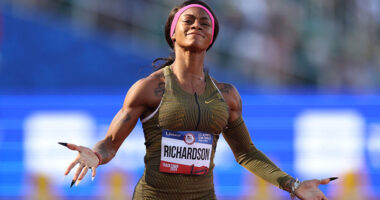Caitlin Clark has emerged as a prominent figure in women’s basketball, drawing significant attention and acclaim. Her talent on the court is undeniable, but her meteoric rise also brings to light underlying racial dynamics that shape how athletes are celebrated in America.
As sports journalist Jemele Hill pointed out in the LA Times, “We would all be very naive if we didn’t say race and her sexuality played a role in her popularity. While so many people are happy for Caitlin’s success — including the players; this has had such an enormous impact on the game — there is a part of it that is a little problematic because of what it says about the worth and the marketability of the players who are already there.”
This Ain’t Nothing New
To understand Caitlin Clark’s impact, it’s essential to look back at how race has influenced the success of White individuals in fields dominated by Black talent. Elvis Presley became the King of Rock ‘n’ Roll, a genre deeply rooted in African American culture. Similarly, Eminem rose to prominence in hip-hop, a genre born from Black experiences.
Both artists were undoubtedly talented, but their race played a significant role in their widespread acceptance and commercial success. Caitlin Clark’s situation in women’s basketball mirrors this phenomenon.
This is Not About Caitlin Clark
Caitlin Clark is a formidable basketball player. Her high school career was marked by record-breaking performances, and she has continued to excel in college basketball. Leading the nation in points and assists, Clark’s prowess on the court is impressive. She has become a household name, celebrated for her scoring ability, court vision, and leadership.
Acknowledging her talent is crucial, but it’s also important to recognize how her race contributes to the attention she receives.
The Role of Race in Her Popularity
Caitlin Clark’s rise to fame cannot be examined without considering the racial dynamics at play. As a White athlete excelling in a sport where Black athletes have historically dominated, Clark benefits from increased media coverage and public interest.
This phenomenon is driven by the racial representation factor, where White athletes often receive more visibility and support due to the majority population in America being White. This creates a feedback loop where White athletes become more marketable and receive more opportunities, further perpetuating their prominence.
Marketability and Capitalism: Show Me The Money!
Caitlin Clark’s marketability extends beyond her skills. She represents a lucrative investment for brands and media outlets, aligning with the commercial interests that favor White representation. Her endorsements and media appearances are a testament to how race and representation influence marketability. In a capitalist society, athletes who appeal to the majority demographic are more likely to secure lucrative deals and widespread recognition.
What If Caitlin Clark Was Black?
Jemele Hill’s statement in the LA Times sheds light on the problematic aspects of Caitlin Clark’s popularity. Hill emphasizes that race and sexuality play significant roles in her acclaim. This sentiment is echoed by A’ja Wilson, who said:
“I think it’s a huge thing. I think a lot of people may say it’s not about Black and White, but to me, it is. It really is because you can be top-notch at what you are as a Black woman, but yet maybe that’s something that people don’t want to see. They don’t see it as marketable, so it doesn’t matter how hard I work. It doesn’t matter what we all do as Black women, we’re still going to be swept underneath the rug. That’s why it boils my blood when people say it’s not about race because it is.”
Other players have also voiced their concerns about the disparities in opportunities and recognition. These statements highlight the systemic issues that Black female athletes face, despite their talent and hard work.
The Bigger Conversation
Despite their achievements, Black women in sports often receive less recognition and fewer opportunities. This disparity reflects broader systemic issues within sports and media representation. Addressing these issues requires a conscious effort to recognize and celebrate talent equitably, regardless of race.
Caitlin Clark’s success in women’s basketball is a testament to her talent, but it also underscores the racial dynamics that influence how athletes are celebrated. Recognizing these dynamics is crucial for creating a more equitable and inclusive sports culture. By acknowledging the deeper issues of race and representation, we can work towards a future where all athletes are valued and celebrated for their contributions to the game.
The conversation about Caitlin Clark’s rise to fame should not only celebrate her achievements but also prompt reflection on how we can address the racial disparities that persist in sports. It’s a call to action for fans, media, and the sports industry to ensure that talent is recognized and rewarded equitably, paving the way for a more inclusive future in women’s basketball.









